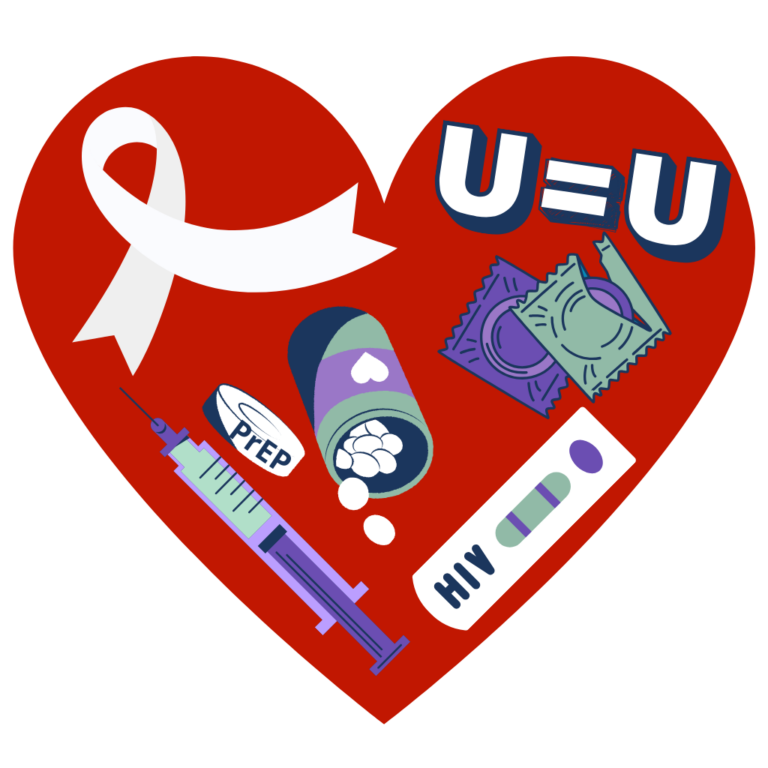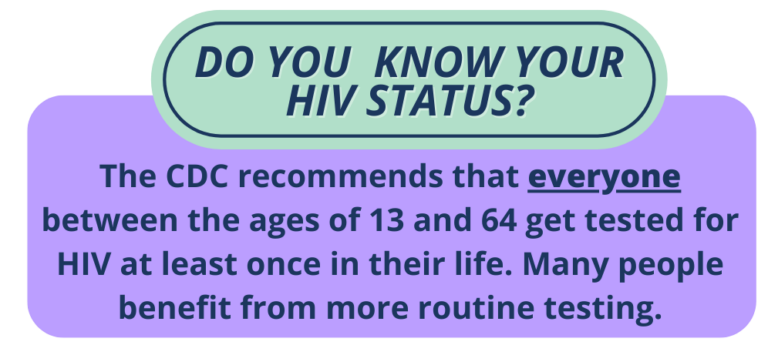HIV stands for human immunodeficiency virus. HIV weakens a person’s immune system by destroying important cells that fight off infections. Our immune plays an important role in protecting us from pathogens like bacteria, viruses, and fungi and untreated HIV can reduce the ability of the body to fight off these infections.
There is currently no curet for HIV, but treatment for HIV is very effective. With treatment a person can live a long healthy life.
HIV treatment is so effective that it can reduce the amount of HIV virus in a person’s body to an undetectable level. Someone with a undetectable level of HIV in their body (also called an undetectable viral load) cannot pass HIV on to their partner(s). This is called U=U or undetectable = untransmittable and it is 100% effective in preventing the sexual transmission of HIV and also helps to prevent passing HIV from sharing syringes, childbirth, and breastfeeding.
Getting tested is the first step!


What is HIV?
HIV (human immunodeficiency virus) is a virus that attacks the body’s immune system. Without treatment it can lead to AIDS (acquired immunodeficiency syndrome) also called stage 3 HIV which can be life threatening.
Who can get HIV?
HIV can affect anyone who has unprotected sex, regardless of gender or sexual orientation.
How do I know if I have HIV?
The only way to know your HIV status is to get tested. There are many options for quick, free, and painless HIV testing. Health departments can confidentially test you and your partner(s) any time for HIV. If your test result is positive, there are safe and effective treatments to help you live a long, healthy life, and protect others. If your test result is negative, there are prevention options to prevent getting HIV.
Who should get tested for HIV?
The CDC recommends that everyone between the ages of 13 and 64 get tested for HIV at least once. People who might have ongoing vulnerability should get tested more often.
What are signs and symptoms of HIV?
Most people have flu-like symptoms within 2-4 weeks after getting HIV and those symptoms can last for a few days or several weeks. Some people have no symptoms at all. The only way to know if you have HIV is to get tested.
How does HIV spread?
Most people who get HIV get it from anal or vaginal sex, sharing needles, syringes, or other items used to inject drugs. HIV is spread through blood, semen, pre-seminal fluid, rectal fluids, vaginal fluids, and breast milk.
Can HIV be prevented?
Yes! There are many effective tools to prevent HIV and many can be combined.
*It’s important to note that people who are living with HIV that are on effective treatment and have a sustained undetectable viral load cannot pass HIV to overs through sex. See more about this in the U=U section.
Can HIV be treated?
HIV is treated with ART (antiretroviral therapy). ART is safe and effective and should be taken as soon as possible after an HIV diagnosis. HIV treatment reduces the amount of HIV virus int he blood (viral load). HIV treatment can make the viral load so low that a lab test cannot detect it. This is called an undetectable viral load. Having an undetectable viral load (or staying virally suppressed) is the best thing a person living with HIV can do to stay healthy. It also means that person cannot pass HIV through sex to others (U=U).
What is U=U?
U=U means undetectable equals untransmittable. It means that a person with a undetectable viral load cannot pass HIV to others through sex. Having an undetectable viral load also reduces the risk of HIV transmission through sharing drug injection equipment and during pregnancy, labor and delivery.
How does HIV progress (if not treated)?
When people get HIV and are not in treatment, for whatever reason, they typically progress through three disease stages. HIV treatment can slow down and even prevent this progression which is why Stage 3 (AIDS) is far less common today.
Stage 1: Acute HIV
Stage 2: Asymptomatic HIV (also called Chronic HIV or clinical latency)
Stage 3: Acquired Immunodeficiency Syndrome (AIDS)
Learn more about HIV from the CDC here.
Under construction
Under construction
Under construction
Coming soon!